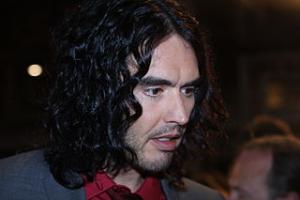Drug War Issues
Politics & Advocacy
Actor, comedian, and ex-heroin addict Russell Brand appeared before a parliamentary committee in London Tuesday and told MPs that drug taking should not be approached as a "criminal or judicial matter" and that decriminalizing drug use could be "useful" in some regards.

Russell Brand at the premiere of Arthur (wikimedia.org)
Brand was asked about drug legalization, but demurred, saying he didn't think he was "particularly qualified" to make that judgment. He added, however, that, "I'm not saying we should have a wacky free-for-all where everyone takes drugs, it didn't do me any good."
The flamboyant entertainer appeared before the Home Affairs Committee, which is reviewing British drug policy. The Tuesday hearing was the fourth in what the committee is calling "a comprehensive review" of the drug laws. The committee also heard from opponents of relaxing the drug laws, including columnist Peter Hitchens and campaigner Mary Brett of Cannabis Skunk Sense, an all-volunteer group whose mission is to "raise awareness of the continuing and growing threat to children, teenagers and their families, posed by cannabis use."
Brand, who has had a more than decade-long career as a comic in Britain, exploded on the US scene with his portrayal of heedless rock star Aldous Snow in 2008's Forgetting Sarah Marshall, a role he reprised and expanded on as the falling-off-the wagon rocker in Get Him to the Greek in 2010. Brand also played the role of the alcohol-besotted title character in last year's Arthur, a remake of the Dudley Moore classic.
But Brand has also been a thoughtful and incisive author, commentator, and radio and television host whose views have been informed by his own struggles with substances. His 2007 autobiography My Booky Wook dealt extensively with his drug-using career and subsequent abstinence, and he won wide acclaim for his open letter For Amy after the alcohol overdose death of Grammy award-winning chanteuse Amy Winehouse last year.
The legal status of drugs didn't matter much to addicts, Brand said. "I'm not a legal expert. I'm saying that, to a drug addict, the legal aspect is irrelevant," he said. "If you need to get drugs, you will. The criminal and legal status, I think, sends the wrong message. Being arrested isn't a lesson, it's just an administrative blip," he added.
"For me what is more significant is the way we socially regard the condition of addiction," Brand said. "It is something I consider to be an illness, and therefore more of health matter than a criminal or judicial matter. It is more important that we regard people suffering from addiction with compassion and there is a pragmatic rather than a symbolic approach to treating it."
Brand pointed to the experience of Portugal, which decriminalized drug possession in 2001, saying decriminalization could be "useful and efficient." Instead of using the "carrot and stick," Brand said, drug addiction should be approached with "love and compassion."
The committee will conduct further hearings before issuing a report.
This work by StoptheDrugWar.org is licensed under Creative Commons Attribution-ShareAlike 4.0 International
Comments
A powerful harm reduction carrot to offer hard drug users
Society should offer a contract to any hard drug user willing to sign, or at least to any addict, which is where the main threat to public safety lies, because of the big bucks needed to feed their addiction with black market priced drugs: A simple contract - if the addict doesn't cause society any problems, they can have their drug legally, free market priced, not black market. Those who can afford it can pay a tax to help finance the whole program. If they are too far gone to work, it would probably be worth our while to pay for their drugs, that would be a lot cheaper and safer than throwing them in jail after they steal to get funds for black market drugs, and a lot more likely to lead to successful rehab than treating them as less than human achieves. I suspect most addicts would go for this, which means the cartels would lose their most important remaining customers, after cannabis legalization will have already taken a huge bite out of their hide.
Add new comment